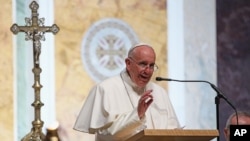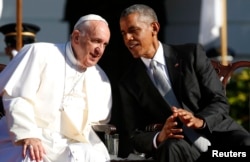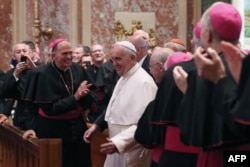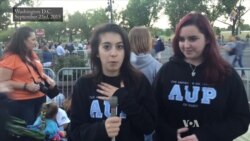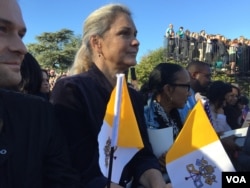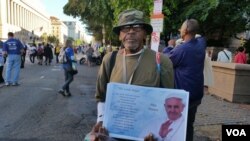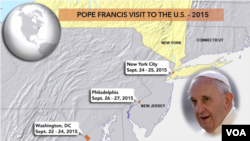Pope Francis appealed to the United States Wednesday to take urgent action and help slow the pace of climate change, because the world is at "a critical moment of history."
President Barack Obama warmly welcomed the leader of the Roman Catholic Church to the White House on a beautiful autumn morning in Washington, and he agreed that Americans and people throughout the world have "a sacred obligation to protect our planet."
The president and the pope were speaking at an official arrival ceremony celebrating the pontiff's first visit to the United States. They saluted each other in speeches that were frequently interrupted by applause from 15,000 invited guests on the White House lawn.
Crowds of other well-wishers turned out to get a glimpse of the pope from afar.
"What a beautiful day the Lord has made," Obama said, adding that the pope's "message of love and hope has inspired so many people, across our nation and around the world."
Turning to the 78-year-old pope, the president praised the pontiff for "your humility, your embrace of simplicity, the gentleness of your words and the generosity of your spirit."
"You remind us that in the eyes of God our measure as individuals, and as societies, is not determined by wealth or power or station or celebrity, but by how well we hew to Scripture’s call to lift up the poor and the marginalized, to stand up for justice and against inequality," Obama said.
The president's speech referenced refugees fleeing war-torn lands, religious liberty and the "sacred obligation to protect our planet." He also thanked the pope for his efforts to bring Cuba and the United States closer together after decades of distrust.
Pope Francis highlighted his background -- born in Argentina to parents who emigrated from Italy to South America -- in his opening speech.
"As the son of an immigrant family, I am happy to be a guest in this country, which was largely built by such families," he said in English. "I would like all men and women of good will in this great nation to support the efforts of the international community to protect the vulnerable in our world."
Francis called on Americans to take urgent steps to prevent environmental ruin and also to address poverty. "When it comes to the care of our 'common home,' we are living at a critical moment of history," he said in echoing his June encyclical on the environment.
Addressing climate change "can no longer be left to a future generation," he added.
And for all the United States has done and continues to do in addressing world problems, the pope said in conclusion: "God bless America."
The two leaders then went inside the White House for private talks in the president's Oval Office. Together with first lady Michelle Obama, they also waved to the crowd from a balcony of the presidential mansion.
During their one-on-one meeting at the White House, Obama presented Francis with two gifts: a sculpture of an ascending dove, an international symbol of peace as well as the Christian symbol for the Holy Spirit; and a key from the Maryland home of Elizabeth Ann Seton, the first native-born American to be declared a saint.
After meeting with Obama, Francis led a worship service with America's 450-strong bishops' conference at the Cathedral of St. Matthew the Apostle, where he told U.S. Roman Catholic bishops that crimes of sexual abuse of minors by clergy should never be repeated.
While the pope did not utter the words "sexual abuse," he referred to the scandal by talking about "difficult moments" and providing help for victims.
"I know how much the pain of recent years has weighed upon you, and I have supported your generous commitment to bring healing to victims ... and to work to ensure that such crimes will never be repeated," Francis told the bishops, who applauded.
Under enormous public pressure, the U.S. Conference of Catholic Bishops pledged to oust any guilty clergy from church work and enact safeguards for children.
However, the scandal persists, and victims say the bishops still haven't fully accounted for sheltering abusers. This year, three bishops resigned over their failures to protect children.
Direction of the church
Many U.S. bishops -- nearly all were appointed by Popes John Paul II and Benedict XVI -- have struggled to come to terms with Francis' new social justice-minded direction of the church.
Pope Francis returned to the Papal Nuncio after the service.
Later Wednesday, the pope is to canonize Junipero Serra, an 18th-century Spanish missionary who spread the word of the church in what is now California, at the national shrine of the U.S. Catholic Church, the Basilica of the Immaculate Conception.
Serra's elevation to sainthood is a sore point for many Native Americans, who say Serra contributed to the abuse and elimination of many indigenous tribes from enslavement and disease.
White House officials said the pope and the president have many shared values, on social justice, climate change and other issues.
Some conservatives have criticized Francis' economic views, calling them Marxist, but the pope has defended himself against what he contends is an inaccurate description of him as "left-leaning."
While flying to the United States from Cuba Tuesday, Francis told reporters: "I am certain that I have never said anything beyond what is in the social doctrine of the church. It is I who follow the church. ... My doctrine on all this ... on economic imperialism, is that of the social doctrine of the church."
Pope Francis has also spoken out against the persecution of religious minorities – particularly in the Middle East, where Islamic State militants have targeted Christians and Yazidis in deadly attacks. This commitment to religious liberty and the rights of religious minorities is another value he shares with Obama, the president's advisers say.
In contrast, Obama and the pope differ sharply on issues, such as abortion and same-sex marriage.
WATCH: Parade spectators react to Pope's US visit
Tens of thousands of people eager to see the pope packed the streets of the national capital Wednesday -- around the Washington Monument and National Mall, around the national shrine in the northern part of the city and near the home of the Vatican's papal nuncio (ambassador) to the United States, where Francis is staying while in Washington.
Cheering crowds jammed the heavily guarded parade route along streets near the White House. Some people held out babies to be blessed by the pope, with bodyguards ferrying the tots from behind police barricades to the pope, who rode in an open-sided popemobile -- a white Jeep.
Before departing for the White House Wednesday morning, Pope Francis stopped to talk to people gathered outside the Apostolic Nunciature, the Vatican's Embassy, where he is staying while in Washington.
Earlier at the South Lawn welcoming ceremony, Christina Toth from Boyds, Maryland, said, "I feel like this is a pope for the people. He stands for all of humanity and power and he seems very approachable. We haven't seen that in a pope before."
Toth said she is a Catholic, "more so now than any other time in my life," due to Francis' papacy.
Ben Paracchio of Asheville, North Carolina, said, "This is a historic moment. I'm really fortunate that I get to be here. I really admire this pope and all that he stands for."
Margarita Fuentes of Washington, D.C., but originally from El Salvador, stood for six hours to get a chance to see and hear the pope on the South Lawn during the arrival ceremony, but says "It was worth it, it was amazing."
"I am 200 percent Catholic and agree with everything he does. He is going to save our lives, nations, and communities all over the world,” Fuentes said. "He really feels the pain of every single human being. We are blessed to have a pope like him."
The pope arrived in the United States Tuesday after a historic visit to Cuba and the Vatican hosted U.S. and Cuban delegations last December as both sides finalized an agreement.
Obama last met with the pontiff at the Vatican in March of 2014 – but it is the first time the pontiff has set foot on American soil.
Trip details
On Thursday, Francis becomes the first-ever pope to deliver an address before a joint meeting of Congress.
He will travel later Thursday to New York City, where he will celebrate Mass at St. Patrick's Cathedral. On Friday, he will address the United Nations General Assembly.
On Saturday morning, he'll travel to Philadelphia for this weekend’s Vatican-sponsored World Meeting of Families.
On Sunday, he will celebrate an outdoor Mass, which is expected to draw nearly 2 million people.
Richard Green contributed to this report. Some material for this report came from Reuters and AP.




